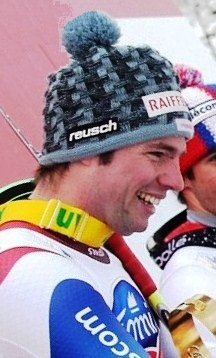Final point standings
In men's downhill World Cup 1968/69 the best 3 results count. Deductions are given in ().
Contents
| Alpine skiing World Cup | |
| Men | |
Overall | Downhill | Giant slalom | Slalom | |
| 1969 |
| 1969 Men's Downhill World Cup | |
| Previous: 1968 | Next: 1970 |
Men's downhill World Cup 1968/1969
In men's downhill World Cup 1968/69 the best 3 results count. Deductions are given in ().
| Alpine skiing World Cup | |
| Men | |
Overall | Downhill | Giant slalom | Slalom | |
| 1969 |

Downhill is a form of alpine skiing competition. Whereas the other alpine skiing events emphasize turning and technique, downhill emphasizes "the six components of technique, courage, speed, risk, physical condition and judgement", according to the FIS "International Ski Competition Rules (ICR)". Speeds of up to 130 km/h (81 mph) are common in international competition. Athletes must have an aerodynamically efficient tuck position to minimize drag and increase speed.

Giant slalom (GS) is an alpine skiing and alpine snowboarding competitive discipline. It involves racing between sets of poles ("gates") spaced at a greater distance from each other than in slalom but less than in Super-G.

Super giant slalom, or super-G, is a racing discipline of alpine skiing. Along with the faster downhill, it is regarded as a "speed" event, in contrast to the technical events giant slalom and slalom. It debuted as an official World Cup event during the 1983 season and was added to the official schedule of the World Championships in 1987 and the Winter Olympics in 1988.

Alpine skiing has been contested at every Winter Olympics since 1936, when a combined event was held in Garmisch-Partenkirchen, Germany.
Combined is an event in alpine ski racing. The event format has changed within the last 30 years. A traditional combined competition is a two-day event consisting of one run of downhill and two runs of slalom; each discipline takes place on a separate day. The winner is the skier with the fastest aggregate time. Until the 1990s, a complicated point system was used to determine placings in the combined event. Since then, a modified version, called either a "super combined" or an "Alpine combined", has been run as an aggregate time event consisting of two runs: first, a one-run speed event and then only one run of slalom, with both portions held on the same day.
The 39th World Cup season began in October 2004 in Sölden, Austria, and concluded in March 2005 at the World Cup finals in Lenzerheide, Switzerland. The overall winners were Bode Miller of the U.S. and Anja Pärson of Sweden.
The 38th World Cup season began in October 2003 in Sölden, Austria, and concluded at the World Cup finals in Sestriere, Italy, in March 2004. Sestriere would host the alpine skiing events at the 2006 Winter Olympics.
The third World Cup season began in December 1968 and concluded in March 1969. This was the first season in which the races began prior to January 1, and that change immediately became permanent. Karl Schranz of Austria won the first of two consecutive overall titles. Gertrude Gabl of Austria won the women's overall title. For the first and only time in World Cup history, a discipline trophy was shared by more than two people, as four men tied for the Men's Slalom trophy.
The 2nd World Cup season began in January in West Germany and concluded in April in the US Jean-Claude Killy of France repeated as the overall champion, and announced his retirement from World Cup competition. Nancy Greene of Canada repeated as the women's World Cup overall champion, and announced her retirement from World Cup competition.
The 1st World Cup races began in early January in West Germany and concluded in late March in the United States. Jean-Claude Killy of France dominated the men's competition, winning each of the three disciplines and the overall title. Nancy Greene of Canada edged out Marielle Goitschel of France for the women's overall title, her first of two consecutive titles, defending successfully in 1968.

Bernhard Russi is a former World Cup alpine ski racer from Switzerland. Born in Andermatt in the canton of Uri, he is an Olympic, World Cup, and World champion in the downhill event.
Men's downhill World Cup 1967/1968
William Besse is a Swiss former alpine skier. He took four wins and 13 podiums in the FIS Alpine Ski World Cup, all of them in the downhill discipline, including winning the Lauberhorn downhill in Wengen in 1994. He retired from competition in 1999, in part because he struggled to adapt to the introduction of carving skis in the mid-1990s. After retiring from competition, he became a ski instructor in Verbier, and also worked as an analyst for Télévision Suisse Romande and Radio Télévision Suisse's coverage of alpine skiing, until he was let go after the 2014-15 season.
For the 1992 Winter Olympics in Albertville, France, a total of thirteen sports venues were used. Val-d'Isère has been part of the Alpine Skiing World Cup since the late 1960s while Tignes served as host of the first Freestyle World Ski Championships in 1986. Most of the venues used were constructed between 1987 and mid 1990 with the test events taking place in late 1990 and early 1991. It was the last Winter Olympics with an outdoor speed skating rink which led to weather issues for three of the ten events. Three cross-country skiing events were run in snowstorms while the men's 20 km biathlon was found to be 0.563 km (0.350 mi) too short. The downhill events in alpine skiing were criticized for being too steep. Freestyle skiing made its official debut at these games with the men's winner being stormed after his win while the women's winner won her event in a snow storm. La Plagne hosted the skeleton World Championships in 1993 while Val-d'Isère hosted the Alpine World Ski Championships in 2009.

The 48th World Cup season began on 26 October 2013, in Sölden, Austria, and concluded on 16 March 2014 at the World Cup finals in Lenzerheide, Switzerland. The defending overall champions from the 2013 season were Marcel Hirscher of Austria and Tina Maze of Slovenia. The overall titles were won by Hirscher and Anna Fenninger, also of Austria. The season was interrupted by the 2014 Winter Olympics that took place from 7 to 23 February in Sochi, Russia, with the alpine events at Rosa Khutor.

The 49th World Cup season began on 25 October 2014, in Sölden, Austria, and concluded on 22 March 2015 at the World Cup finals in Meribel, France. The defending overall champions from the 2014 season - Marcel Hirscher and Anna Fenninger, both of Austria, defended their titles successfully. The season was interrupted by the World Championships in February, in the United States at Vail/Beaver Creek, Colorado. Combined events were not awarded as a discipline trophy.
The Men's Downhill competition of the Grenoble 1968 Olympics was held at Chamrousse on Friday, 9 February.
The Women's Downhill competition of the Grenoble 1968 Olympics was held at Chamrousse on Saturday, 10 February.

The men's downhill in the 2021 FIS Alpine Skiing World Cup consisted of seven events. The original schedule had contained nine downhills, but a rescheduled one on 5 March in Saalbach-Hinterglemm, Austria, was canceled due to fog and continual snowfall after just nine skiers had finished, and the downhill during World Cup finals week was also canceled.